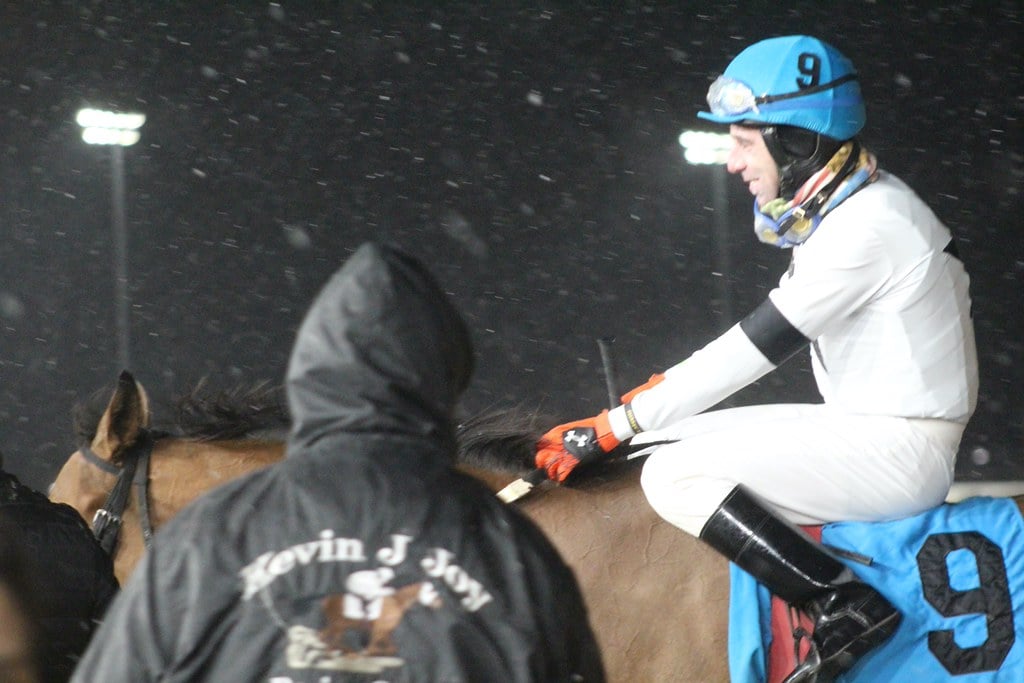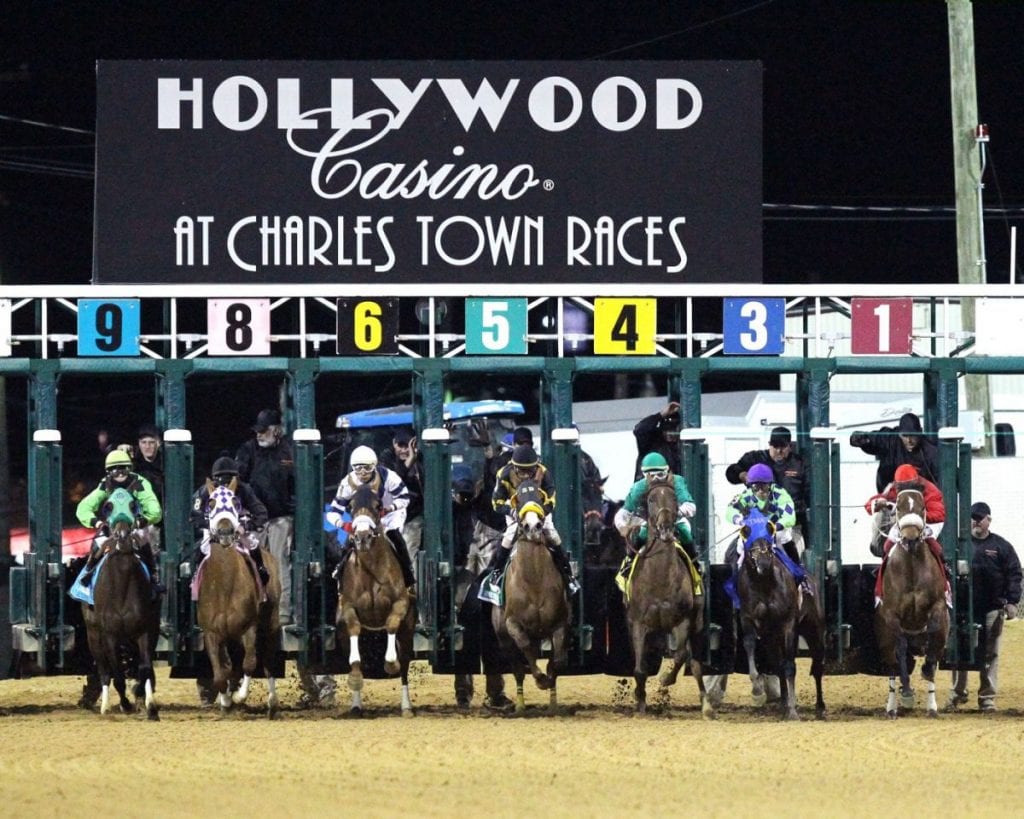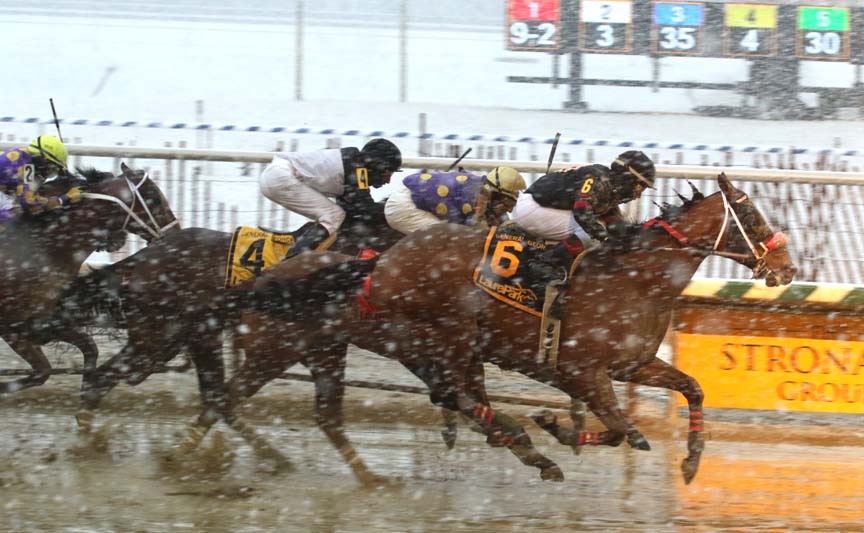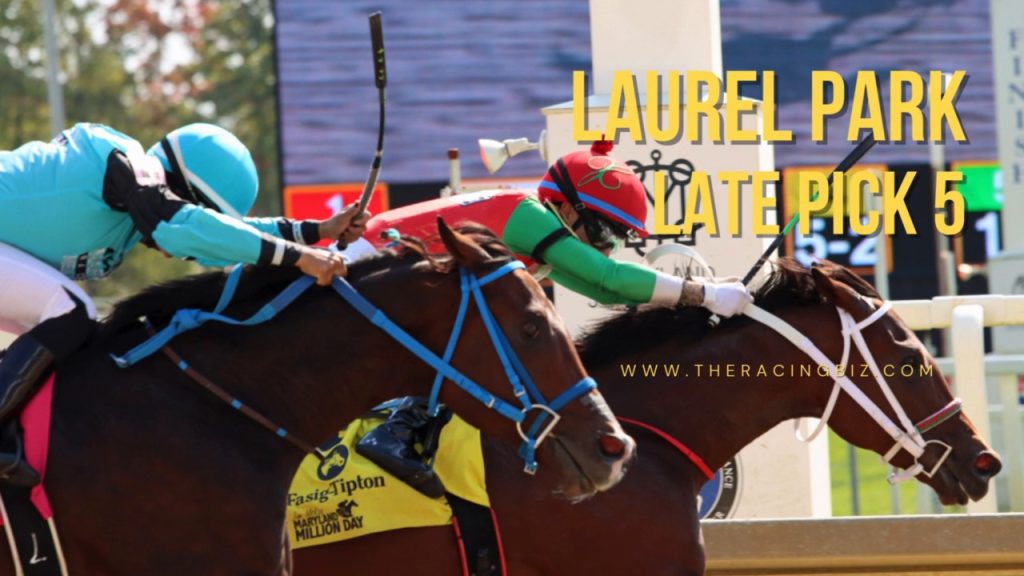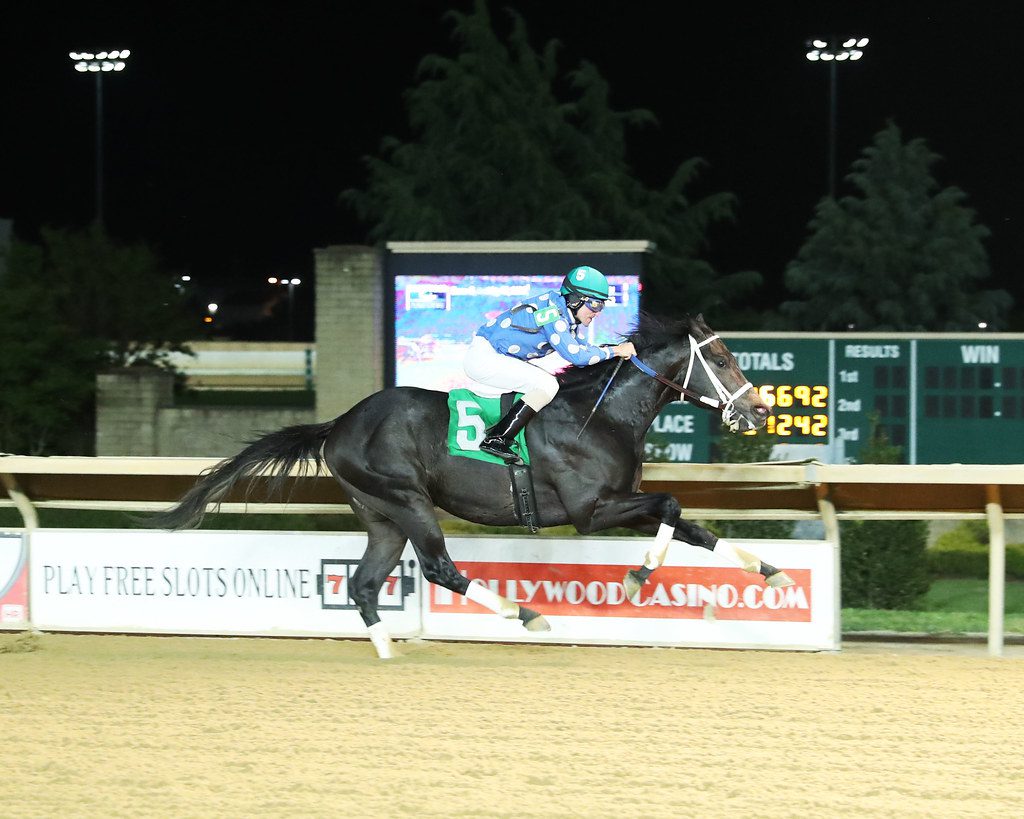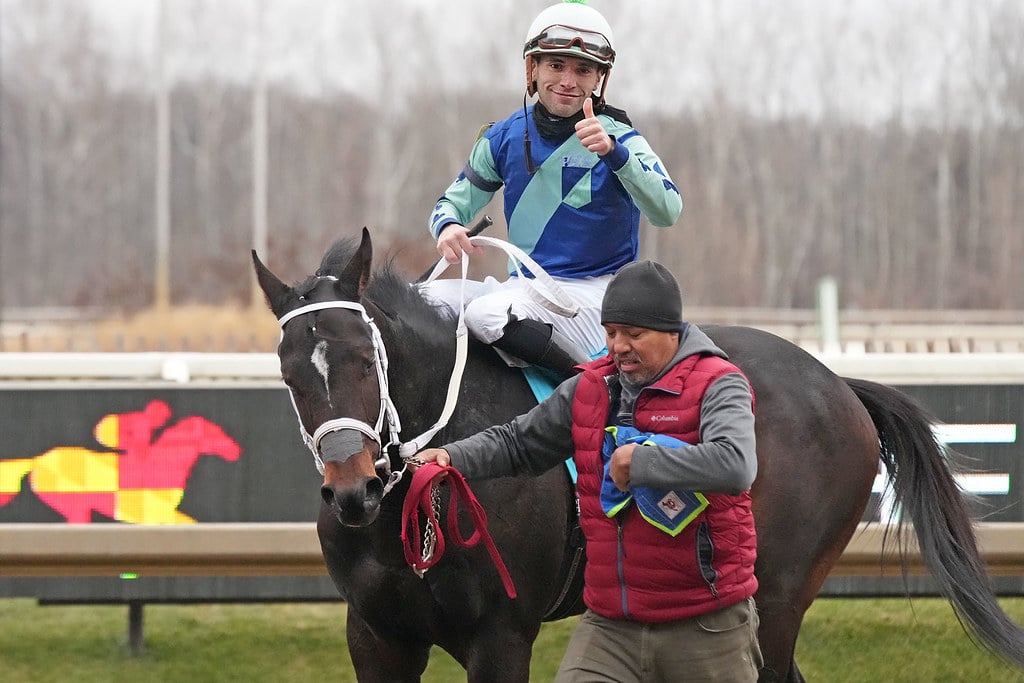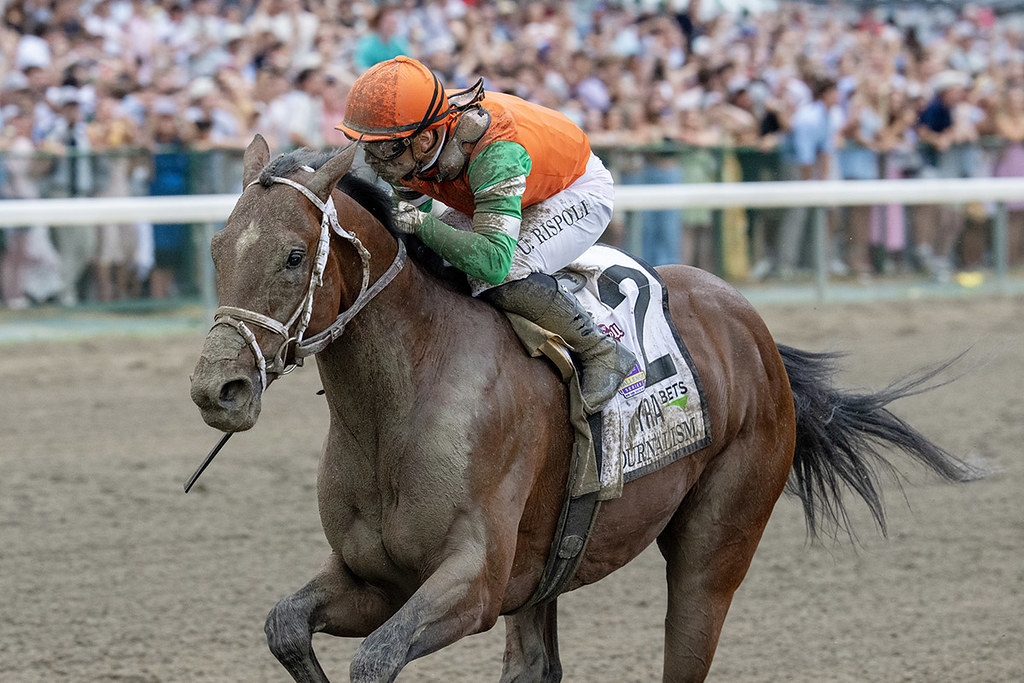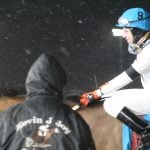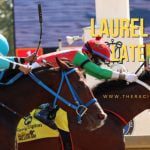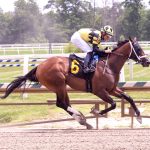A few minutes with… Suzanne Stettinius
by Mackenzie Pfeiffer
If there’s one thing Suzanne Stettinius isn’t, it’s ordinary.
Whether she’s scoring an upset win or offering candid insights into the highs and lows of the racing world, her humor, humility, and competitive drive make her an undeniable force.
In a rare instance when Suzanne sat still, I caught up with her to dive into how her second year of full-time training is going, and how her athletic background has shaped the way she approaches both her horses and the sport.
Mackenzie Pfeiffer (MP): You had a solid weekend! That was quite a streak – four wins in a row. Are you still buzzing?
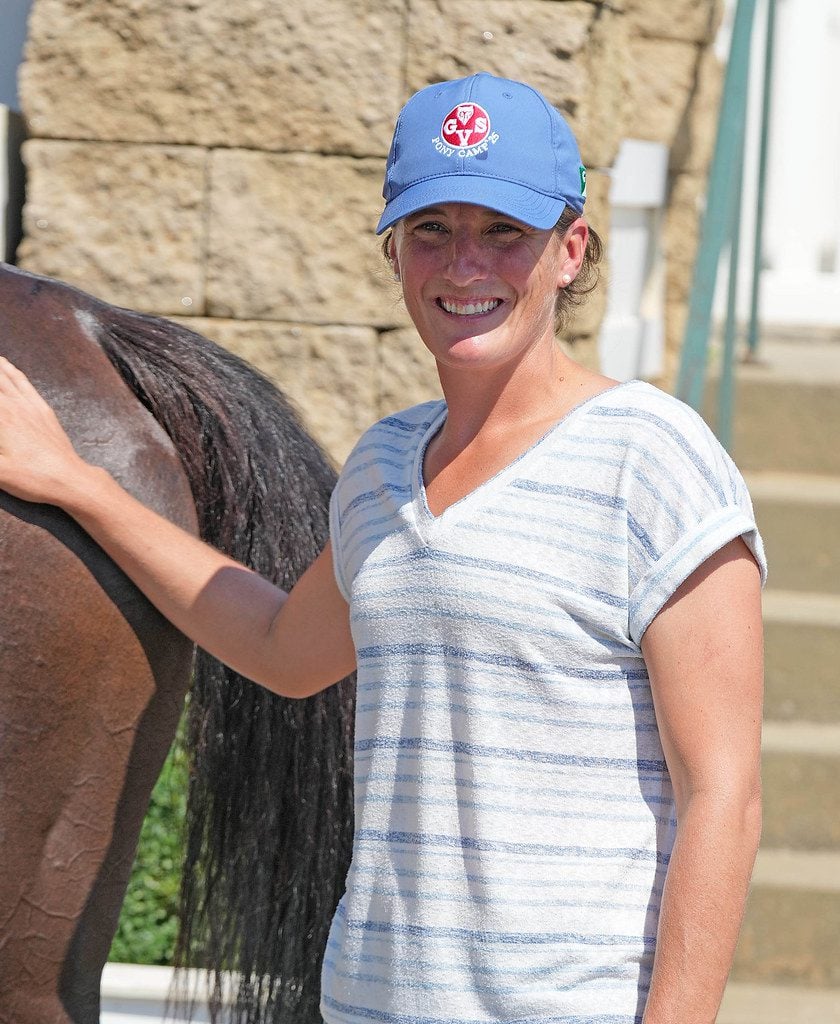
Suzanne Stettinius (SS): Catie Keil just sent me this picture of the leading trainers. Heck yeah! I thought that I had to frame this. I’ll never see this again (laughs). Trombetta, Russell… and then me. In the top 3?
MP: Not bad! Turf Festival weekend went well for you.
SS: I’m probably getting humbled hard next weekend. They wrote a mile-and-a-half turf allowance. Finally! I’ve been dying for one, they never write them. So now I’m like, where do we go now? Wait for a non-winner of three? Owhatanite loves to run, so we’re just going to let him.
MP: Strike while the iron’s hot. For context, do you think most people know you went to the Olympics as a pentathlete?
SS: Probably not! I sometimes mention it casually, and people go, “What?” It’s kind of fun. I like surprising people. Just don’t make me sound cocky! I swear, everything right now just feels like luck.
MP: Ha! I doubt anyone’s thought that. When you were in that part of your life, did you ever imagine ending up as a full-time trainer?
SS: Honestly, no. I never thought I’d do horses for a living. I went to school, worked for Pepsi, and had one racehorse for fun. I’m competitive, and racing gave me an outlet after being an athlete myself.
MP: What shifted?
SS: Pepsi sold the juice business, so my job went away. I was pregnant with my second son, and my husband – he’s so supportive – told me to go for it. I said to give me a few years. I might make zero the first one. Now, the horses are paying their way. That’s my goal. If they can pay their way, maybe I can take the winter off!
MP: How did the transition work from Ann (Merryman) to Michael (Merryman) and you?
SS: Perfect timing. Michael was cutting back, so I took over some of his. Ann called and asked if I wanted to partner on hers. She has been my best friend since I was 12. We work great together. I call her every day to pick her brain. She’s incredibly supportive and knowledgeable.
MP: You rotate horses between the track and the farm a lot. How do you balance both?
SS: I try not to keep them at the track longer than two weeks once they are fit and racing. In February, they start jogging hills on the farm and preparing to train. By March, everyone’s at the track galloping because the farm ground isn’t reliable that time of year. Then I can start rotating based on their racing schedules.
After a race, they all come home for two weeks to jog and reset. It really helps them mentally after that rush. Having a solid fitness base lets me focus on getting them to feel good, not just training hard.
LISTEN TO THE LATEST OFF TO THE RACES RADIO!
MP: Earlier this season, you skipped the point-to-points and thought maybe a few horses needed a race. Did that end up mattering?
SS: Some can win off the bench, but others really benefit from having a race under them. Especially the lazier ones. B Determined is like that. It tightens them up. It also depends on how the spring ground is. Greenspring and Middleburg are lovely courses if the timing lines up.
MP: You’ve improved a few horses significantly after claiming them. What gives you that edge?
SS: A lot of people don’t like turf horses. They get scratched when races come off the turf and end up running on the dirt where they don’t belong. It can be really frustrating. That’s when I start paying attention. I like giving them the winter off, starting them back my way. Sometimes it works out, sometimes not. I’m not a miracle worker! (laughs)
Part of this is knowing when to stop. I have retired a lot of horses who would be better suited for other jobs. I think I sold four last year. Not for much money, they don’t owe me anything, but I want to see them have a happy life. I just received a photo of one foxhunting the other day!
MP: That is so nice to see! Boss Is a Pal, he’s one who you claimed and improved. How did you develop him?
SS: I got him for $5,000 when he was running on the dirt. We gelded him, gave him a solid four months off, then started him back. At first, he’d just go straight to the front and get caught.
So, my friend and I, she co-owns him, decided we needed to figure out a way to train him to settle. We would do a lot of two-mile gallops, teaching him to wait until the last quarter to run. Then, one day, he started relaxing and finishing his races.
I never want to change a horse’s running style in the afternoon by telling a jockey to rush them or take back, I want the horse to run their race. But I also don’t want them opening in 44 (laughs). It’s about getting them to relax wherever they can. I know from my own experience as a runner, if you go all-out in the first quarter, you’re not going to be running very fast in the last one.
MP: Do you think being an athlete helps you relate to your horses?
SS: A hundred percent. Ann and I were just talking about this. Runners train around heart rate. I don’t have a monitor, but I do a lot of interval training: up, down, up, down. So, I’m less focused on weekly half-mile breezes and more on building long-term fitness or endurance.
It doesn’t work for everyone, but I have a small barn, so everything’s individualized. I ride everyone at least once a week myself. I want to know how they’re feeling.
MP: And it’s paying off! Parkes, for example – that debut was impressive.
SS: That was one of my most exciting wins. You’d have thought it was the Kentucky Derby. I did everything with him – broke him, trained him. One day at Pimlico, he dropped me four times. I called Ann crying, saying I couldn’t do it. We gelded him and then sent him to Merryland for a few weeks, so I kind of cheated. But otherwise, I brought him along myself.
When he got left at the start, I just hoped he wouldn’t be last. I knew he was more racehorse than that. Then, he started moving up. I thought maybe he could be third. Then, he just fired. Ismerio (Villalobos) gave him such a great ride. Let him settle, didn’t panic, weaved through horses. He never ever flipped the stick on him. That was kind of fun to see. I’ve watched that replay 300 times.
MP: Were you glad you nominated to the Laurel Futurity before the debut?
SS: That was 100% my partner, Ann Merryman, for the record. I kept saying he felt good, I knew we had done enough to have him ready for the race. Ann thought we might have a chance to win the race. I just wanted him to go out and have a good start, get the experience, maybe pick-up a check. We thought that he can go all day and might run along. Ann said “Let’s just nominate him. It’s free. We can see who’s in it. Then if he runs great, we have the option.”
He came out of the race great. There aren’t a ton of opportunities for the two-year-olds that you think highly of at the end of turf season. So, it’s definitely in our consideration. Definitely not 100% set on going there, but it’s now an option.
MP: What was his training program leading up to the debut?
SS: It’s nice running short the first time out. You don’t need as many breezes, and you don’t have to go two turns. Even though he only had three official works, I had been building him up for a while with short bursts, sometimes twice a week. Ann has a beautiful gallop on her farm. He has done that a lot. I knew he was fit. I just didn’t know if he was a racehorse (laughs).
I wanted Ismerio to get on him beforehand, I mean, it’s a 2-year-old with only 3 works. He galloped him with me a few days before the race and liked him. In the paddock before the race, Ismerio told me he wanted to move away from the pony and have a gallop, I think it helped him come in with a little confidence in the horse as well.
MP: Parkes showed a lot of class by splitting horses and staying to task.
SS: Yes, that’s how he is in the morning. He’s one of my only two-year-olds, he’ll go out and gallop by himself. Although he did drop me two weeks ago, I had gotten too relaxed. I was jogging and chatting, and he wheeled. I landed on my butt, and he ran right back to the barn and into his stall.
MP: Smart Parkes!
SS: Better than running around the track like a maniac! A few years ago at Pimlico, Mokheef broke through his stall while I was loading another horse and just loaded himself onto the trailer. My groom came out yelling, and there he was, standing inside. I wasn’t planning on taking him back to the farm that day, but apparently, he had other ideas.
MP: Seems like you really let them tell you what they need.
SS: Oh, totally. Mokheef was cheeky – he got away with everything.
MP: After Parkes won, you left with an extra horse in the trailer. What was the plan with Great Artist?
SS: Honestly, I don’t know him that well yet. I can tell you he wouldn’t let me catch him this morning. He was out all day. He was so excited to be out in the paddock. He wouldn’t come near me until the afternoon.
We had really liked the horse and loved the breeding. He comes from off the pace with a run, and I really like that. Horses who stop on the front are tough. It’s hard to claim and not know why they run that way. If they’re running late, at least you know they can breathe. You take a shot on form and replays. He seems like a hard-knocking type. Hopefully, we have fun with him.
MP: That’s a sensible approach. Claiming is tough! It’s also tough to handicap horses who broke their maidens in amateur races. But you’ve now won again with both of yours.
SS: Ha! I give Sophie O’Brien all the credit. She broke the unlucky streak with the Imagining babies. When she rode Owhatanite, it was pouring. We couldn’t see a thing. She said she couldn’t see anything, so she just let the horse run.
For the recent wins, I just took note of what worked. I told the jockeys they’re not super-fast, but they’ll keep going. Let them relax. When Princess Clemmie got the lead and went in 50, I was stunned. I was with family upstairs watching the race. They thought someone fell out the window, I was yelling so loud. It doesn’t always work out that way, especially now that things get tougher.
MP: You’ve had a few big prices with the winning streak. Do the odds matter to you? Do you want to be the favorite?
SS: When the form comes out, you kind of know. Sure, it’d be great to be the favorite and say, this is our race. But when the gates open and you’ve got the yellow box around your number? I just think, please don’t embarrass me!
At 10-1, there’s less pressure, but you still feel like you have a chance. Really, the pressure comes from me. I’m competitive, but I’ve gotten better. I know I’ll lose more than I win. I get them ready, and once the gate opens, it’s out of my hands. You just want to be able to run your race.
MP: You are always scouring the condition book, if you could write any race, what would it be?
SS: Oh gosh, I’m trying to think of a horse I’m dying to win with. Probably a starter $12,500 in 2024/2025 going a mile on the turf. I have three for that condition (laughs).
MP: Seems reasonable enough. How about the next ten years, do you think you’ll still be training?
SS: If it keeps going the way it is, then yes. But what are the odds of that? It’s nice having a few more horses and bringing the young ones along. If they keep paying their way and we’re having fun with it, then yes, I would love to keep going with it. I love the game. I love the sport. I love that now I don’t have to compete myself. I can just let them do it.
LATEST NEWS


